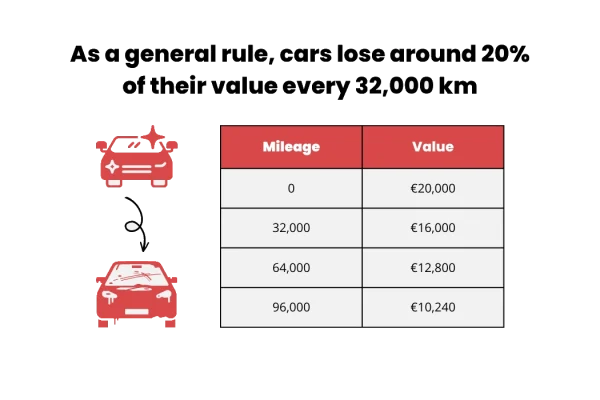Car Mileage Calculator
What Is the Average Annual Car Mileage in the UK?
Understanding the average annual car mileage in the UK is crucial for both vehicle owners and potential buyers. It not only provides insights into typical car usage patterns but also helps in making informed decisions about purchasing, leasing, or maintaining a vehicle. Whether you’re curious about how your driving habits compare to the national average or you’re in the market for a new car, this comprehensive guide will answer all your questions.
Why Is Knowing the Average Annual Mileage Important?
Average annual mileage is a significant factor that influences many aspects of car ownership, including:
- Vehicle Depreciation: Cars with higher mileage tend to depreciate faster than those with lower mileage. Knowing the average can help you gauge the expected wear and tear on your vehicle.
- Resale Value: When selling your car, potential buyers will often compare your vehicle’s mileage against the national average to determine if it has been heavily used or not.
- Insurance Premiums: Many insurance companies base their premiums on the annual mileage of a vehicle. Cars that are driven less are often cheaper to insure.
- Maintenance and Repairs: Higher mileage generally means more frequent maintenance and repairs. Understanding average mileage helps you anticipate and budget for these expenses.
- Leasing Considerations: If you’re considering leasing a car, knowing the average mileage is essential. Most lease agreements come with mileage limits, and exceeding these can result in hefty penalties.
What Is the Average Annual Mileage in the UK?
The average annual mileage for cars in the UK has been a topic of interest for many years. As of recent reports, the average annual mileage for a car in the UK is around 7,400 miles. However, this figure can vary significantly depending on several factors, including the type of vehicle, the age of the vehicle, and the owner’s driving habits.
- Private Cars: For privately-owned cars, the average annual mileage is typically lower, around 6,500 to 7,000 miles.
- Company Cars: Vehicles used for business purposes tend to clock up more miles, often averaging between 10,000 to 12,000 miles per year.

Factors Influencing Annual Mileage
Several factors can influence how many miles a car is driven annually. Understanding these can help you better interpret the average figures:
- Location: Urban drivers typically cover fewer miles annually than those living in rural areas due to shorter commutes and less frequent long-distance travel.
- Vehicle Type: Different types of vehicles are used for different purposes. For example, a family sedan might have lower annual mileage compared to a business vehicle like a van or an estate car.
- Fuel Type: Diesel cars, often chosen for their efficiency on long journeys, generally have higher annual mileage compared to petrol or electric vehicles.
- Age of Vehicle: Newer cars tend to accumulate more miles annually than older cars, which might be used less frequently or reserved for shorter trips.
- Purpose of Use: Vehicles used for commuting, business, or long-distance travel will naturally have higher mileage than those used primarily for local errands.
Using Our Calculator to Find Your Average Mileage
Understanding where your vehicle stands in relation to the national average can be incredibly useful. That’s why we’ve developed a user-friendly mileage calculator that allows you to easily determine the average mileage for your specific vehicle and its age.
How to Use the Calculator:
- Enter Your Vehicle Information: Start by entering basic details about your vehicle, such as the make, model, and year of manufacture.
- Input Current Mileage: Provide the current mileage of your vehicle. This will help the calculator determine how your mileage compares to the national average.
- Calculate: Hit the calculate button, and our tool will instantly show you the average annual mileage for your vehicle type and age, along with a comparison to the national average.
This tool is particularly useful for:
- Potential Buyers: Assess whether a used car you’re considering is a high-mileage or low-mileage vehicle.
- Current Owners: Understand how your driving habits stack up against the national average.
- Sellers: Provide potential buyers with accurate mileage information to support your asking price.
How Does Your Mileage Compare?
Once you’ve used our calculator, you might be wondering how your mileage compares to others. Here’s what different mileage figures can tell you:
- Below Average Mileage (< 5,000 miles per year): This is often considered low mileage and could indicate a vehicle that has been used sparingly, such as for local trips or as a second car. Low-mileage vehicles often command higher resale values.
- Average Mileage (5,000 – 10,000 miles per year): If your vehicle falls within this range, it’s considered to be within the typical usage for UK drivers. Cars with average mileage tend to have balanced wear and tear, making them attractive options for buyers.
- Above Average Mileage (> 10,000 miles per year): Vehicles with high mileage may have seen more extensive use, such as for business purposes or long-distance commuting. While high-mileage vehicles can be a great value, they might also require more maintenance.



Leave a Reply